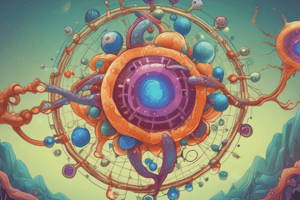Podcast
Questions and Answers
What is the primary focus of genetics?
What is the primary focus of genetics?
- Studying cells and their functions
- Understanding genes, inheritance, and gene expression (correct)
- Investigating plant-specific cell structures
- Exploring the economic and social impacts of biology
Who first discovered cells in plants in the 17th century?
Who first discovered cells in plants in the 17th century?
- Gregor Mendel
- Louis Pasteur
- Robert Hooke (correct)
- Charles Darwin
What is the function of genes in cells?
What is the function of genes in cells?
- Facilitating access to genetics education
- Maintaining cell structures like the cytoskeleton
- Regulating the population's health
- Producing proteins essential for growth and survival (correct)
Which scientific field studies the structures and functions of cells?
Which scientific field studies the structures and functions of cells?
How are genetics and socioeconomic backgrounds related according to the text?
How are genetics and socioeconomic backgrounds related according to the text?
How does economic inequality impact biology according to the text?
How does economic inequality impact biology according to the text?
What is highlighted by the interconnectedness of biology and society in the text?
What is highlighted by the interconnectedness of biology and society in the text?
How are genetics and cell biology described in the text?
How are genetics and cell biology described in the text?
What do genetics and cell biology provide according to the text?
What do genetics and cell biology provide according to the text?
What is attributed to human curiosity and drive in the text?
What is attributed to human curiosity and drive in the text?
What influence does socioeconomic inequality have on the evolutionary landscape of populations, according to the text?
What influence does socioeconomic inequality have on the evolutionary landscape of populations, according to the text?
How has genomic research impacted our understanding of evolution?
How has genomic research impacted our understanding of evolution?
What did the mapping of cat and dolphin genomes provide insights into?
What did the mapping of cat and dolphin genomes provide insights into?
What did the discovery of the plant Golgi apparatus contribute to in cell biology?
What did the discovery of the plant Golgi apparatus contribute to in cell biology?
How have plant cells contributed to our understanding of cellular processes?
How have plant cells contributed to our understanding of cellular processes?
What is a unique strategy utilized by land plants and most streptophytic algae for cell-plate formation?
What is a unique strategy utilized by land plants and most streptophytic algae for cell-plate formation?
How does the study of plant Golgi apparatus contribute to understanding cellular processes?
How does the study of plant Golgi apparatus contribute to understanding cellular processes?
What does the convergence of evolutionary, genetic, and cellular insights lead to in the field of biology?
What does the convergence of evolutionary, genetic, and cellular insights lead to in the field of biology?
How does genomic research contribute to understanding the evolutionary history of species?
How does genomic research contribute to understanding the evolutionary history of species?
What societal implications are highlighted in the text regarding genetics and socioeconomic inequality?
What societal implications are highlighted in the text regarding genetics and socioeconomic inequality?
Study Notes
Biology's Grand Tapestry: Genetics and Cell Biology
Understanding how life functions at its foundational levels reveals profound insights into our world. Genetics and cell biology, two interconnected domains of biology, offer a lens into life's intricate design.
Genetics: The Code of Life
Genetics revolves around the study of genes, their inheritance, and their expression. Genes are segments of DNA that encode instructions for assembling proteins, a process essential for growth, reproduction, and survival.
Genetic inequality is an issue extending beyond the realm of biology, with research suggesting that socioeconomic backgrounds can influence access to genetics education and careers in science.
Cell Biology: Life's Building Blocks
Cell biology is the study of cells, their structures, and their functions. Cells constitute the basic unit of life, containing specialized structures and components like the cytoskeleton, endoplasmic reticulum, and organelles.
Robert Hooke, in the 17th century, first discovered cells in plants, leading to the development of cell theory and subsequent scientific advancements. Plant cell biology continues to reveal plant-specific cell structures and mechanisms.
The Bigger Picture: Biology's Economic and Social Landscape
As scientific knowledge has grown, it has become increasingly clear that the health of populations is inextricably linked to their socioeconomic backgrounds. Economic inequality, for example, has been shown to inflict biological harm by increasing chronic inflammation, chromosomal aging, and brain dysfunction.
This adds a deep layer of complexity to the interplay between biology and society, demonstrating that biology is not merely a collection of isolated facts but a dynamic, interconnected system.
The Continuing Evolution of Genetics and Cell Biology
Genetics and cell biology continue to evolve as new technologies and techniques are developed, allowing for deeper investigations into the complexities of life. This ongoing process of discovery and innovation is a testament to the power of curiosity and the human drive to understand our world.
A Final Thought
Genetics and cell biology provide a powerful perspective on life's intricacies, revealing the complexity of life and the deep connections between biology and society. These domains of biology serve as a foundation for our understanding of the natural world, equipping us with the knowledge to advance science and the tools to improve our lives.
Studying That Suits You
Use AI to generate personalized quizzes and flashcards to suit your learning preferences.
Description
Test your knowledge of genetics, cell biology, and their impact on society with this quiz. Explore the intricate world of genes, cells, and the interplay between biology and socioeconomic factors.




